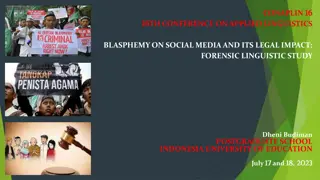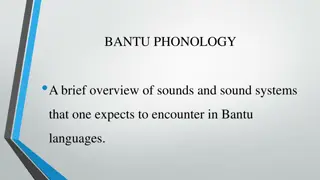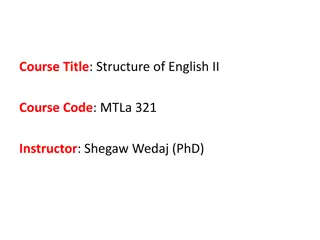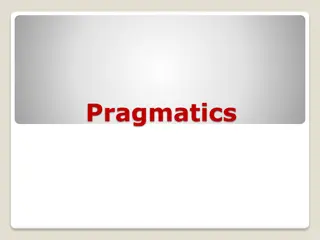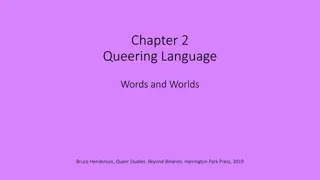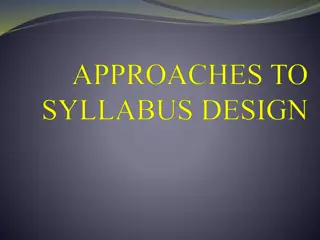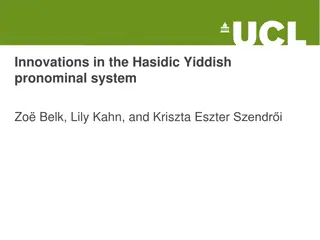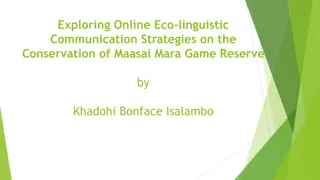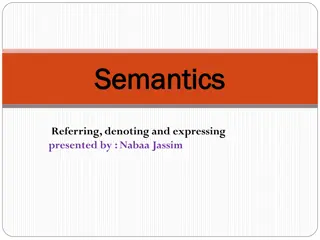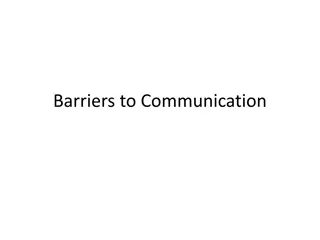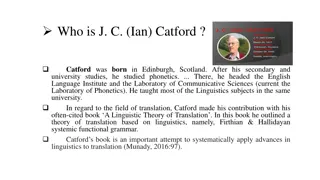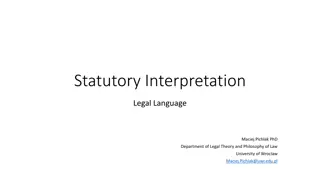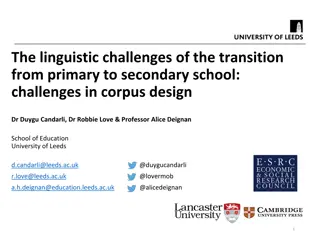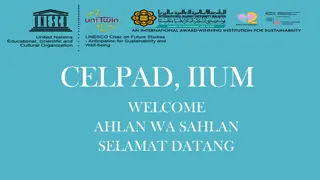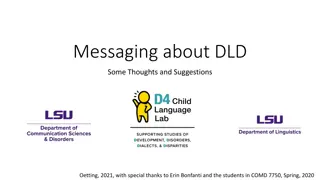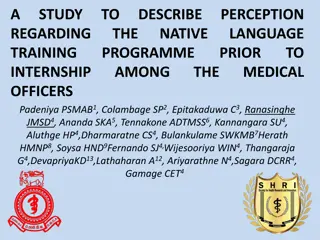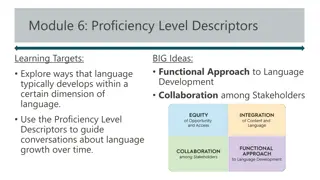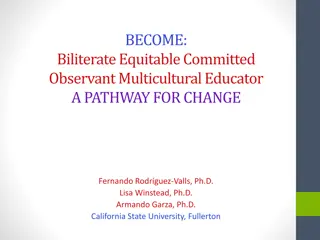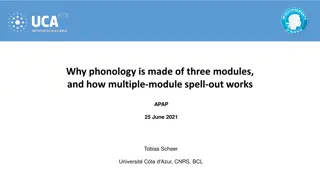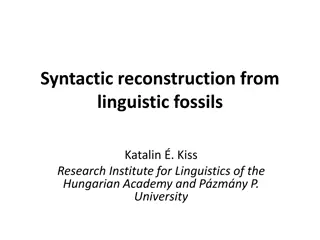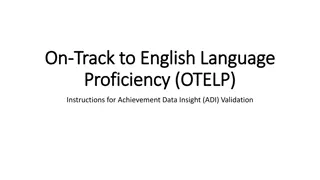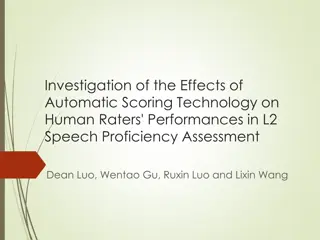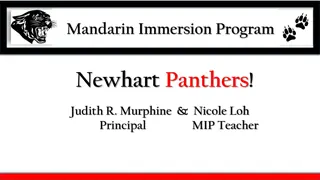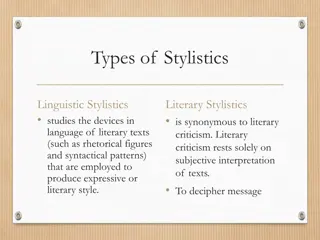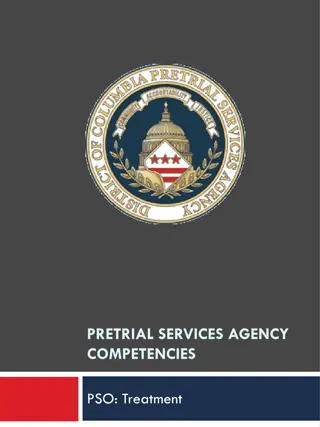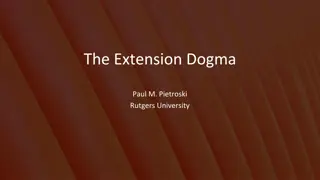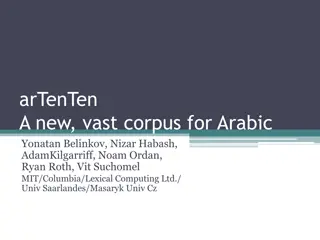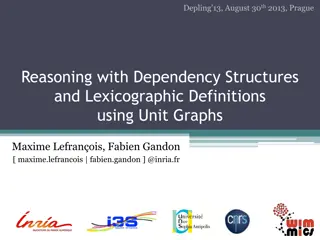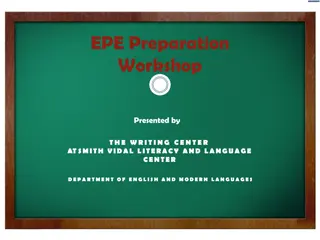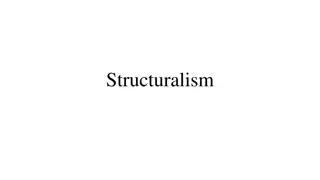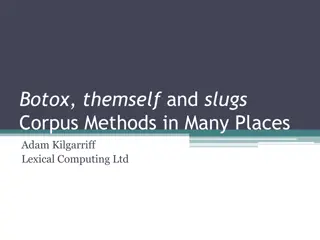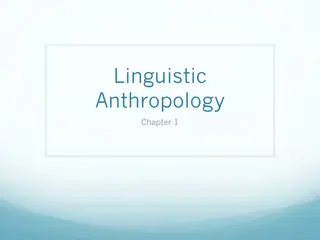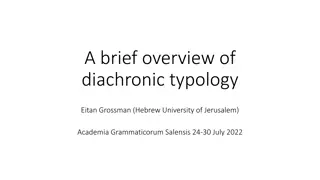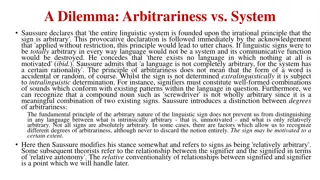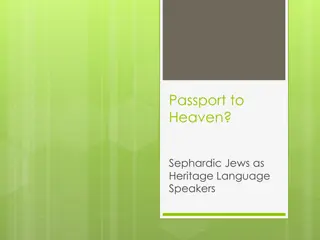Impact of Blasphemy on Social Media: Forensic Linguistic Analysis
Language plays a crucial role in human communication, especially on social media platforms where public speech can have legal consequences. This research delves into the concept of blasphemy on social media and its legal implications, focusing on linguistic forensic study. It explores how language c
7 views • 24 slides
The Significance of Media in Language Learning
Media plays a crucial role in language learning by raising awareness of the ideology behind linguistic structures and providing valuable information on society and culture. Linguists are drawn to media language for research purposes and to understand its impact on language use and attitudes. Media s
12 views • 5 slides
Overview of Stilistik in Bachelor's Studies
Stilistik in a Bachelor's program covers theoretical basics, stylistic concepts, micro and macro stylistics, and key texts in the field. It explores stylistic analysis, linguistic disciplines, communication styles, and the impact of style on various forms of expression including everyday communicati
6 views • 63 slides
Exploring Bantu Phonology and Linguistic Classification
Delve into the intriguing world of Bantu phonology and linguistic classification, covering the diverse sounds and phonological processes found in Bantu languages. Discover the rich heritage of over 500 Bantu languages in sub-Saharan Africa, classified into zones and classes, shedding light on the fa
0 views • 38 slides
Understanding Structural Linguistics: An Exploration of Language and Signs
Delve into the intricate world of structural linguistics through an in-depth analysis of language components, linguistic signs, and the relationship between language and linguistics. Explore the concepts of syntagmatic vs. paradigmatic relations, linguistic signs as associations of sound and meaning
4 views • 62 slides
Exploring Pragmatics in Linguistics Studies
Pragmatics delves into the study of implied meanings and how we interpret language in various contexts. It focuses on understanding communication beyond explicit words and explores the invisible meanings conveyed through situational and linguistic contexts. Deixis, physical context, and linguistic c
0 views • 41 slides
Exploring Queer Language and World
Examining the linguistic aspects of queerness, this content delves into the history and evolution of terms like queer and homosexual. It discusses the reclaiming of queer identity, its association with leftist politics, and the linguistic reclamation process. Various perspectives on queer terminolog
0 views • 24 slides
Understanding Language Teaching Syllabus: Integration, Theory, and Approaches
Language Teaching Syllabus involves the integration of subject matter and linguistic elements, guided by theories of language and learning. Various approaches like Grammatical, Situational, Communicative, and Analytic are used to structure syllabi. Breaking language into parts aids in sequential lea
1 views • 28 slides
Innovations in Hasidic Yiddish Pronominal System
Explore the evolution of pronouns in the Hasidic Yiddish language system, showcasing simplifications and changes over time. The research delves into the linguistic characteristics of Hasidic Yiddish speakers in Stamford Hill, London, highlighting the influences of various Hasidic groups and geograph
1 views • 24 slides
Strategies for Online Eco-Linguistic Communication in Maasai Mara Conservation
Maasai Mara faces threats from human encroachment, prompting conservation efforts. This study explores online eco-linguistic strategies for engaging the public in conservation activities. The importance of language in online communication to achieve ecological harmony is highlighted, emphasizing eco
0 views • 17 slides
Understanding Semantics: Exploring Linguistic Meaning and Expression
Exploring the realm of semantics, this content delves into how language is used to refer, denote, and express concepts in the world. It discusses the importance of linguistic meaning, different approaches to studying it, and the distinction between denotational and cognitive semantics. By examining
0 views • 7 slides
Understanding and Overcoming Communication Barriers
Communication barriers, such as physical, linguistic, cultural, mechanical, organizational, and psychological factors, can hinder effective message transmission and understanding. Physical barriers like noise and environmental stress, linguistic barriers including language ambiguity and jargon, cult
0 views • 11 slides
Understanding J.C. Catford's Linguistic Theory of Equivalence in Translation
J.C. Catford, a prominent figure in translation studies, developed a theory of equivalence in translation based on functional linguistics. His work emphasizes the process of substituting text from one language to another, focusing on formal and textual equivalence. Catford's theory sheds light on ho
2 views • 12 slides
Exploring Meaning, Thought, and Reality in Linguistics
Delve into the fascinating realm of semantics and linguistic theories, where the interplay between language, thought, and reality is deciphered. Concepts like reference, denotation, and the relationship between linguistic expressions and the world are explored through the works of renowned linguists
0 views • 37 slides
Understanding Statutory Interpretation in Legal Context
Explore the intricacies of statutory interpretation, linguistic and non-linguistic methods, and types of interpretation in legal contexts. Uncover the significance of legal reasoning, historical perspectives, and comparisons between Anglo-Saxon and Continental legal cultures. Delve into the complexi
1 views • 17 slides
Challenges in Transition from Primary to Secondary School: Corpus Design
The linguistic challenges in transitioning from primary to secondary school in England are explored in this project. The focus is on academic school language and the barriers students face in understanding the curriculum, particularly at the start of Key Stage 3. The differing registers of academic
0 views • 28 slides
Important Announcement for New Intake Students - Semester 1, 2022/2023
Welcome to all new intake students of Semester 1, 2022/2023! Prepare for the English Proficiency Test (EPT), Arabic Proficiency Test (APT), and Tilawah Proficiency Test (TPT). Join the respective Telegram groups for details. No registration is required – just be present at the designated exam venu
0 views • 6 slides
Linguistic Microaggressions in Messaging about DLD: Thoughts and Suggestions
Linguistic microaggressions in the discourse surrounding Developmental Language Disorder (DLD) can perpetuate negative stereotypes and harm individuals. This content discusses the concept of linguistic microaggressions, explores the ambiguity in messaging about DLD, and highlights the importance of
3 views • 12 slides
Language Proficiency Among Post-Intern Medical Officers in Sri Lanka
Sri Lanka being a multi-lingual country, effective communication in both Sinhala and Tamil is crucial for post-intern medical officers. This study describes the self-perceived language proficiency and alternative communication methods due to lack of proficiency. Results reveal the challenges faced b
0 views • 12 slides
Language Development and Proficiency Level Descriptors in Educational Settings
Explore the Proficiency Level Descriptors and characteristics of language development in different dimensions, focusing on ways language evolves and the collaboration among stakeholders. Delve into how discourse progresses across the six proficiency levels and how teachers can utilize PLDs to suppor
0 views • 8 slides
Culturally Responsive Biliteracy in Inclusive Education
Culturally responsive biliteracy in inclusive education emphasizes the importance of teaching in two languages, valuing diverse cultural and linguistic identities, and creating a participatory and inclusive classroom environment. Educators play a crucial role in fostering language development and ac
0 views • 12 slides
The Three Modules of Phonology and Multiple-Module Spell-Out Systems
Phonology is structured into three modules - Sonority, Laryngeal, and Place - each with its own vocabulary and skeleton for computation. These modules interact in multiple-module spell-out systems to map linguistic structures onto phonetic realizations. Sonority, involving the audibility of linguist
0 views • 67 slides
Syntactic Reconstruction from Linguistic Fossils in Uralic Languages
Linguistic fossils provide valuable insights for syntactic reconstruction in Uralic languages like Hungarian, Eastern Khanty, and Samoyedic. Through a case study, constraints on topical objects and grammatical systems are examined using linguistic fragments.
0 views • 34 slides
On Track to English Language Proficiency: OTELP Achievement Data Insight
The On Track to English Language Proficiency (OTELP) program focuses on determining student inclusion and progress in English language proficiency. It involves analyzing data related to students' ELPA tests, performance levels, domain exemptions, and enrollment records. Key elements include tracking
0 views • 10 slides
Investigation of the Effects of Automatic Scoring Technology on Human Raters' Performances in L2 Speech Proficiency Assessment
This research explores the impact of automatic scoring technology on human raters in assessing L2 speech proficiency. It aims to compare the performances of expert and non-expert teachers, assess whether providing detailed feedback influences their judgments, and determine how to enhance the collabo
0 views • 20 slides
Academic Assessments and Proficiency Overview at Hamilton County Elementary School
This overview provides insights into academic assessments and proficiency levels at Hamilton County Elementary School. It includes data on i-Ready Reading and Math, STAR assessments for Early Literacy, Reading, and Math across different grade levels, as well as Kindergarten and 1st-3rd Grade assessm
0 views • 37 slides
Mandarin Immersion Program at Newhart Panthers: Cultivating Inclusive School Culture and Language Proficiency
Explore the Mandarin Immersion Program at Newhart Panthers led by Principal Judith R. Murphine and Teacher Nicole Loh. Dive into topics like school culture, curriculum, instructional refinements, and STAMP assessment results. Discover the focus on cultivating a culture of inclusion, progressive disc
0 views • 12 slides
Understanding Linguistic and Literary Stylistics
Linguistic Stylistics explores devices in language of literary texts to create expressive styles. Literary criticism relies on subjective interpretation, while Stylistic Analysis in linguistics identifies patterns in speech and writing. This content delves into the phonological, graphological, and l
0 views • 17 slides
Pretrial Services Agency Competencies in Treatment: Knowledge and Skills Assessment
This content outlines the competencies required in the area of treatment by pretrial services agencies. It focuses on the knowledge and skills related to substance-related treatment, mental health disorders, supervision procedures, treatment programs, regulatory knowledge, HISP monitoring policies,
0 views • 22 slides
The Extension Dogma: Exploring Meaning and Extensions in Linguistic Expressions
The Extension Dogma challenges the assumption that linguistic expressions inherently possess meanings. Instead, it posits that expressions have extensions without necessary meanings that determine them. Theories of meaning should focus on the extensions of expressions, while psychological studies of
0 views • 30 slides
Introduction to arTenTen: A New Vast Corpus for Arabic Linguistic Processing
arTenTen is a new corpus for Arabic containing a vast array of text types, rich metadata, and clean linguistic processing capabilities. It offers a significant improvement over existing Arabic corpora, presenting a larger dataset with a variety of linguistic features. The corpus is fully processed,
0 views • 8 slides
Reasoning with Dependency Structures and Lexicographic Definitions using Unit Graphs
This piece discusses the application of knowledge representation in addressing recurrent needs related to manipulating, querying, reasoning, and sharing information, particularly in the linguistic domain of Meaning-Text Theory. Maxime Lefrançois and Fabien Gandon explore formalisms, such as the the
0 views • 56 slides
Understanding the English Proficiency Exam (EPE) at Bowie State University
The English Proficiency Exam (EPE) at Bowie State University tests students' writing proficiency for graduation. This exam format includes three prompts on argumentative topics within a 2-hour time limit. Passing the EPE requires meeting standards in content, organization, style, and grammar. The sc
0 views • 37 slides
Understanding Structuralism in Linguistics: An Overview
Structuralism emerged as a dominant approach in linguistic studies from the 1920s to the 1960s, led by figures like Ferdinand de Saussure. This philosophical perspective focused on the study of language as a stable system of signs, emphasizing the interrelation of mental representations of sounds an
1 views • 28 slides
Understanding Linguistic Features in Trademarks and Branding
Explore the nuances of linguistic features in trademarks and branding through topics such as generic vs. name-like words, trade mark infringement cases, capitalization norms, and the significance of corpus analysis in understanding language usage in branding. Discover how linguistic expertise plays
0 views • 22 slides
Understanding Linguistic Anthropology and Anthropology: A Comprehensive Overview
Delve into the realm of linguistic anthropology and anthropology to explore the study of humans, culture, language, biology, artifacts, and more. Discover the four fields of anthropology, the holistic approach, and the importance of cultural relativism while avoiding ethnocentrism. Learn how linguis
0 views • 25 slides
Exploring Diachronic Typology and Linguistic Diversity
Delve into the fascinating realm of diachronic typology and linguistic properties across languages in time and space. Uncover the distribution of linguistic features, the past tense in various languages, and the underlying constraints shaping language structures. Discover the intricate interactions
0 views • 99 slides
The Principle of Arbitrariness in Linguistic Signs: Saussure's Insight
Saussure's declaration on the arbitrariness of linguistic signs is thought-provoking, emphasizing that while signs are arbitrary, complete arbitrariness would lead to chaos. He distinguishes between degrees of arbitrariness and acknowledges that signs are not entirely arbitrary, being subject to lin
0 views • 9 slides
Exploring Spanish Citizenship for Sephardic Jews: Language and Culture Requirements
The Law 12/2015 grants Spanish citizenship to descendants of Sephardic Jews, emphasizing language and culture proficiency through exams such as DELE A2 and CCSE. The presentation delves into the impact of Law 1/10/2015, the dissonance between Judeo-Spanish and modern Spanish proficiency requirements
0 views • 40 slides
Leveraging Federal Grants for Cultural Proficiency Improvement
Explore ways to enhance cultural proficiency in educational settings using federal grants such as Title I and Title IIA funds. Learn the definition of cultural proficiency, its importance in serving diverse student populations, and practical applications in teaching. Discover how to utilize these fu
0 views • 41 slides
